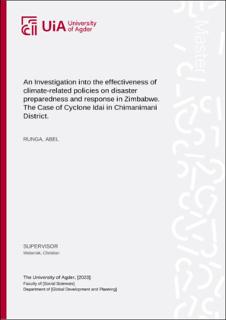| dc.description.abstract | This study investigates the efficacy of climate-related policies on disaster preparedness and
response in Zimbabwe, concentrating specifically on the Chimanimani District during Cyclone
Idai. This study is philosophically based on constructivist ontology, interpretive epistemology,
and a qualitative methodology. The research focused on participants who have substantial or
direct knowledge of the area under study. Using purposive and snowball sampling techniques,
the study gathered a sample of 35 participants. Semi-structured interviews served as the main
instrument for data collection. The research employed thematic analysis to interpret the data,
which involved identifying patterns and themes. To validate the findings, the study used
methodological triangulation, literature review, and theoretical frameworks, which broadened
the understanding of the subject and offered a more thorough analysis of the research
question/s. The theoretical framework was based on five approaches, including the Capability
Approach and the Sendai Framework for Disaster Risk Reduction. The results revealed that
Zimbabwe's policy framework, particularly the Civil Protect Act, concerning disaster
preparedness and response, is centralized, vague, and covers a wide scope. Consequently, it
fails to prioritize preparedness and response strategies adequately. The study also discovered
that the policy framework relating to disaster preparedness in Zimbabwe does not adequately
address the issue, focusing instead on disaster response, albeit insufficiently, and lacks clear
provisions to support a robust response strategy. Nonetheless, the study found that the current
policy framework, while not entirely sufficient to be deemed effective, does offer a rudimentary
guide to disaster preparedness and response, and lays a foundation for the development of a
more inclusive and robust policy framework in Zimbabwe. For short-term improvement, the
study suggests amending the Civil Protection Act to include provisions that ensure policy
framework effectiveness in disaster management and disaster risk reduction. In the longer
term, the study recommends a careful review of the Climate Change Bill before its passage to
avoid carrying forward the vulnerabilities found in the Civil Protection Act. | |
